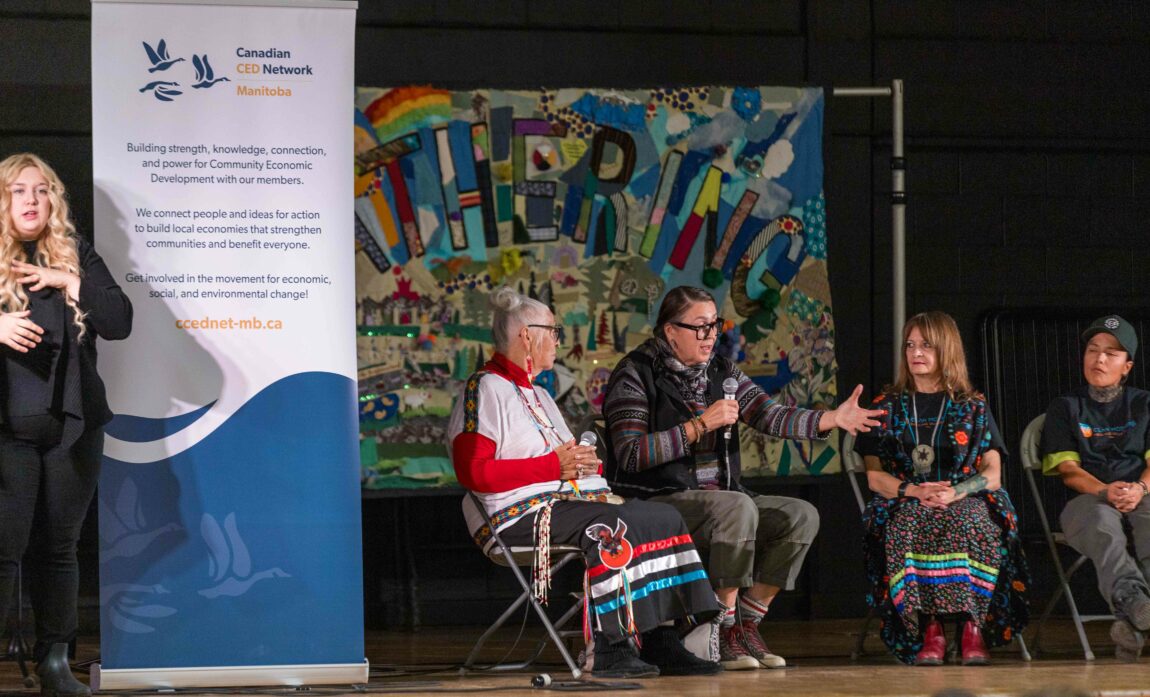Recommendations for a more inclusive and sustainable economy in Manitoba were shared with the Government of Manitoba recently through CCEDNet Manitoba on behalf of the Network’s over 95 member organizations in the province.

Our Network stands behind these recommendations as contributing to key priorities for our province:
- an inclusive economy & economic reconciliation
- Manitoba jobs for Manitobans
- making life more affordable with energy efficient social housing
- community benefits for big projects
- safer & healthier communities.
The public policy solutions presented are based on the innovative Community Economic Development model. This approach involves place-based, community-led action that strengthens local ownership and control and engages the assets and capacity of community members.
Our members believe that when these solutions are scaled up, implemented, or enacted, they will serve to build fairer and stronger local economies, reduce poverty and homelessness, tackle climate change, and ensure sustainable and inclusive communities.
How the Network’s mandate is set
Our public policy mandate is the result of a democratic decision-making process. Every year, members of CCEDNet Manitoba work together to create a pragmatic, wide-ranging, and solutions-focused set of public policy resolutions. At our annual policy summit, members gather to discuss and ratify these ideas after completing consultations and drafting resolutions.
What’s a budget submission and how do I participate?
A budget submission is a written document shared with the government that includes priorities for the government budget. It is an advocacy and lobbying tool, articulating a set of ideas, recommendations, and principles that the group submitting wants the government to adopt.
CCEDNet has been sharing budget submissions on behalf of members at multiple levels of government for many years.
Any Manitoban can get involved and share their opinion about what to include in Manitoba Budget 2024. You are welcome to share and uplift the ideas below. Find out the ways to get involved at this link: as simple as a survey or poll, or join a telephone town hall or meeting, or send in a submission of your own!
Summary of Recommendations
An Inclusive Economy & Economic Reconciliation through Community Economic Development
- Create a Manitoba Social Enterprise Strategy to spur the development and scaling of the sector.
- Create a Manitoba Co-operative Development Strategy to spur the development and scaling of the sector.
- Activate the Community Economic Development Committee of Cabinet through a staffing complement with specific positions to implement CED.
- Strengthen and utilize the Community Enterprise Development Tax Credit as a financing tool for Manitoba community groups, cooperatives, and social enterprises.
Manitoba Jobs for Manitobans
- Stabilize and increase workforce training funding for organizations and/or social enterprises who work alongside low-income communities/individuals with barriers, including organizations providing long-term supports for Indigenous job seekers.
- Provide additional grants to not-for-profit business and enterprise support services so that low-income people, including those living in rural communities, people with disabilities, and others can receive robust and timely services for accessible business, cooperative and social enterprise development training and consulting supports.
- Expand the core funding for the Youth Employment Hub and First Jobs 4 Youth programs to Neighbourhood Renewal Corporations and other community-based organizations across Manitoba through the Department of Families, learning from the successful model at Spence Neighbourhood Association.
- Establish a streamlined and non-stigmatizing fee waiver system that enables low-income Manitobans to obtain or replace a birth certificate free of charge. Ensure that incarcerated individuals are provided with necessary identification, either entering or exiting incarceration, as well as youth exiting Child and Family Services prior to transitioning out of care.
Community Benefits for Big Projects
- Enhance government procurement by intentionally generating economic, social, and environmental outcomes, including creating meaningful employment opportunities, by:
- Requiring social, environmental and/or economic community benefit outcomes when purchasing goods and services by including them in the bid evaluation process, with a particular emphasis on employment and training outcomes
- Creating set-asides in purchasing for access by social enterprises, cooperatives, and/or non-profits, building from the Manitoba Housing model
- Purchasing the social, environmental and economic outcomes directly as a program (for instance, purchasing the services of a social enterprise training program that also provides goods and services to government)
Making Life More Affordable with Energy Efficient Social Housing
- Increase the social housing supply by supporting the capacity of community-based organizations, social enterprises, and cooperatives to build and own more affordable and energy efficient housing through better government and sector alignment, support for organizations to leverage funding, and direct government support. Prioritize retrofitting existing social and affordable housing stock while creating employment opportunities in the green economy.
Safer and Healthier Communities
- Renew a community-led development, neighbourhood renewal program, particularly targeting places facing higher rates of poverty and social exclusion.





